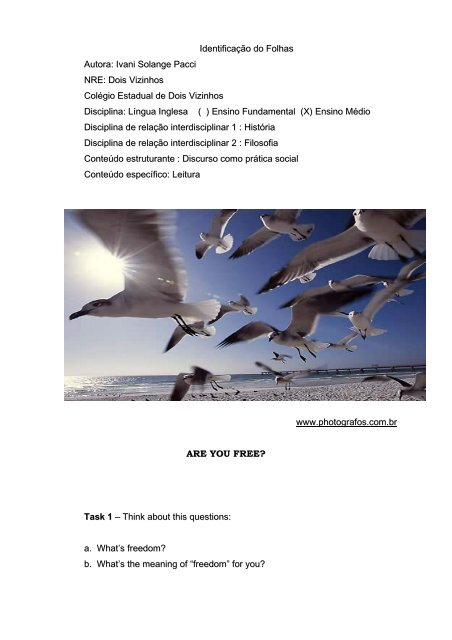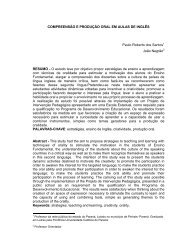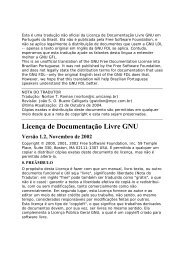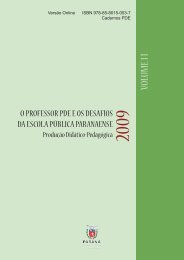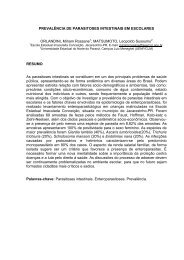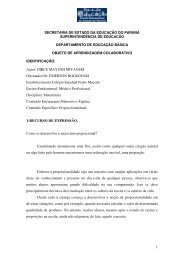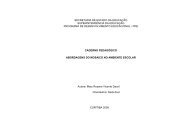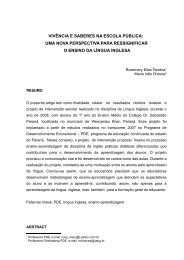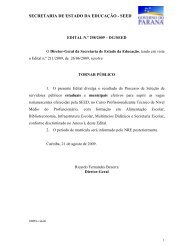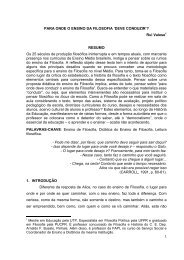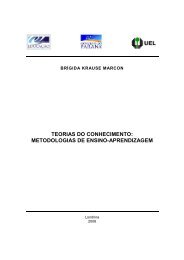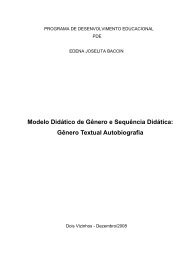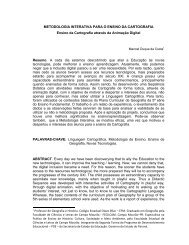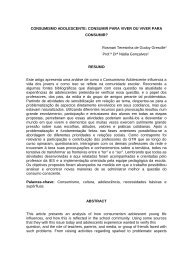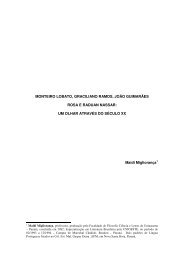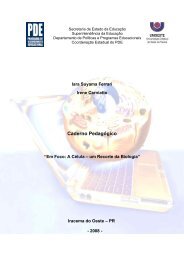Identificação do Folhas Autora: Ivani Solange Pacci NRE: Dois ...
Identificação do Folhas Autora: Ivani Solange Pacci NRE: Dois ...
Identificação do Folhas Autora: Ivani Solange Pacci NRE: Dois ...
Create successful ePaper yourself
Turn your PDF publications into a flip-book with our unique Google optimized e-Paper software.
<strong>Autora</strong>: <strong>Ivani</strong> <strong>Solange</strong> <strong>Pacci</strong><br />
<strong>NRE</strong>: <strong>Dois</strong> Vizinhos<br />
Colégio Estadual de <strong>Dois</strong> Vizinhos<br />
<strong>Identificação</strong> <strong>do</strong> <strong>Folhas</strong><br />
Disciplina: Língua Inglesa ( ) Ensino Fundamental (X) Ensino Médio<br />
Disciplina de relação interdisciplinar 1 : História<br />
Disciplina de relação interdisciplinar 2 : Filosofia<br />
Conteú<strong>do</strong> estruturante : Discurso como prática social<br />
Conteú<strong>do</strong> específico: Leitura<br />
ARE YOU FREE?<br />
Task 1 – Think about this questions:<br />
a. What’s free<strong>do</strong>m?<br />
b. What’s the meaning of “free<strong>do</strong>m” for you?<br />
www.photografos.com.br
Task 2 – Read the text below:<br />
It’s becoming clearer to all of us that world we live in is falling deeper and<br />
deeper into an economic and political crisis.<br />
Latin America is a region of the world where one-half of the population still lives<br />
is dire poverty. Central American human development statistics range from the mediocre<br />
to the truly disastrous thanks to extreme social inequality. Economic grouth has been<br />
painfully slow and badly distributed.<br />
The U.S. government continues to wage its racist, imperialist, “war on terror” –<br />
which has already killed hundreds of thousands in the forced colonizations of Iraq and<br />
Afeganistan – and is stepping up its aggression towards Iran, Syria, North Korea,<br />
Venezuela and Cuba.<br />
The capitalist ruling classes in every country of the world are waging an intense,<br />
one-sided attack on the already low living standards of working people and their<br />
oppressed allies.<br />
The Iraqi, Afghan and Palestinian people continue to resist imperialism by the<br />
means available to them, and Haiti remains ravaged as imperialist soldiers occupy the<br />
country.<br />
A genocide continues in Sudan, tens of thousands of Black people remain<br />
enslaved in Mauritania, and Ethiopia and Eritrea are on the verge of another war.<br />
Revolucionaries continue to fight for the overthrow of the oppressive social<br />
systems in the civil wars of Nepal, Colombia and the Philoppines.<br />
Global warming, caused by the capitalism ruling classes complete disregard for<br />
the natura environment in their constant drive for more and more profits – which has<br />
wrecked and ravaged our planet, has lead the sea level and the earth’s surface<br />
temperature to rise, and has caused the spread of disease, desertification, massive<br />
reductions in the ozone layer, and the increased intensity and frequency of extreme<br />
weather events.<br />
The inability and unwillingness of the governments in the world to respond to<br />
catastrophic natural disasters has laid bare the complete bankruptcy of the capitalist<br />
system – a system based on increasing profits by any means necessary, so that an elite<br />
minority can become richer and richer while the majority falls deeper into suffering.<br />
The majority of the people of the world are extremely poor and uneducated, tens<br />
of thousands starve to death every day, women are abused, oppressed and mistreated,<br />
ethnic minorities are murdered and discriminated against, millions are imprisoned in
horrific conditions, and lesbians, and gay, bisexual, and transgender people are<br />
persecuted. Supporters in many other countries all over the world – have united with their<br />
fellow workers and oppressed people in their every struggle for a better life, and a much<br />
better world. (wikipedia.org/wiki/Latin_América)<br />
Task 3 – Now, talk with your friend and discuss if is possible to be free in this<br />
world, after relate for the class your opinion.<br />
We want EQUALITY – DIGNITY – SOLIDARITY – FREEDOM -…<br />
Let’s to reflect about this words and we will use the book of George Orwell<br />
“Animal Farm”. Did you read or listen to speak about this book? What <strong>do</strong> you Know?<br />
Who was George Orwell?<br />
Full name : Eric Arthur Blair. He was born in Motihari, Bengal in India in 1903.<br />
Author and journalist, noted as a novelist, as a critical and as a political and cultural<br />
commenta<strong>do</strong>r.<br />
What’s“Animal Farm”?<br />
Animal Farm is a novella by George Orwell, and is the most famous satirical<br />
allegory of Soviet totalitarianism. Published in 1945, the book reflects events leading up to<br />
and during the Stalin era.<br />
Task 4 – In groups: Research about George Orwell’s biography and about the<br />
book “ Animal Farm”. Later it presents for the classroom.<br />
Task 5 - Talk with your friends about this question:What’s a revolution in your<br />
opinion? It argues with the group.<br />
Task 6 – Listen to the music by Jonh Lennon and Paul McCartney.<br />
Revolution<br />
You say you want a revolution<br />
Well you know
we all want to change the world<br />
You tell me that it's evolution<br />
Well you know<br />
We all want to change the world<br />
But when you talk about destruction<br />
Don't you know you can count me out<br />
Don't you know it's gonna be alright<br />
Alright Alright<br />
You say you got a real solution<br />
Well you know<br />
we'd all love to see the plan<br />
You ask me for a contribution<br />
Well you know<br />
We're <strong>do</strong>ing what we can<br />
But when you want money for people with minds that hate<br />
All I can tell you is brother you have to wait<br />
Don't you know it's gonna be alright<br />
Alright Alright<br />
You say you'll change the constitution<br />
Well you know<br />
we all want to change your head<br />
You tell me it's the institution<br />
Well you know<br />
You better free your mind instead<br />
But if you go carrying pictures of Chairman Mao<br />
You ain't going to make it with anyone anyhow<br />
Don't you know know it's gonna be alright<br />
Alright Alright
Task 7 – Let’s watch the movie “Animal Farm”. Before some supplement<br />
vocabulary. Relates the columns:<br />
a. Coup d'etat ( ) king<strong>do</strong>m or empire ruled by royalty (a king or queen).<br />
b. Demagogue ( ) a person that rules absolutely and often brutally and oppressively.<br />
c. Anarchy ( ) an absolute and often brutal ruler.<br />
d. Tyrant ( ) a social order without government or law.<br />
e. Suppression ( ) the theory that all government is unnecessary and undesirable.<br />
f. Proletariat ( ) to rid a society of people regarded as undesirable or disloyal or to<br />
eliminate political opposition.<br />
g. Oppression ( ) unjust or cruel exercise of power or authority.<br />
h. Anarchist ( ) to put <strong>do</strong>wn by authority or force.<br />
i. Purge ( ) the working class or labor class.<br />
j. Oppression ( ) the upper middle class.<br />
k. Authoritarian ( ) to run a nation without any real responsibility to to the subjects of<br />
that nation. The people of the nation are to follow the government<br />
blindy.<br />
l. Dictator ( ) a person who appeals to the emotions and prejudices of people to<br />
advance their own political ends.<br />
m. Monarchy ( )The sudden violent overthrow of a government by a small group.<br />
Marx was a historical scientist. He looked at history form a research<br />
perspective. We were not forced into any specific history, but instead, we became who we
are because of the specific, self interest driven choices of individuals. He set out the<br />
progression of this experience in four stages:<br />
Primitive -- people produced only what they needed to live. No exploitation or classes.<br />
Slave -- Tools developed and people were able to create surplus. This made it possible<br />
for a person to <strong>do</strong> enough work to create resources for two. Classes developed out of this<br />
where a class of slaves worked to provide for masters. (Egypt, the Greeks, Rome).<br />
Master, military, and slave class.<br />
Feudal -- Nobles allowed farmers to use their land in exchange for goods. These serfs<br />
were slaves for all practical purposes.<br />
Capitalist -- The development of the industrial age, many people come to cities and<br />
produce in factories for long hours. They receive small wages and in return provide an<br />
excellent living for the few that own the means of production.<br />
Task 8 - Write a two line poem for each of the four society definitions.<br />
Task 9 - Draw a picture for each stage of Marxist historical class conflict.<br />
Task 10 – After to watch the movie put the names of characters of movie and<br />
Russian Revolution according list bellow determing who or what each one might represent<br />
Historical<br />
Animal Farm: Old Major, Mr. Jones, Animalism, Napoleon, Moses the Raven,<br />
Snowball, Squealer, the Dogs, Overall details about Revolution, Benjamin, Boxer.<br />
Russian Revolution: Czar Nicholas II, Dedicated, but tricked communist<br />
supporters, Religion, Karl Marx, Joseph Stalin, Skeptical people in Russia and outside<br />
Russia, Vain:selfish people in Russia and world, Communism, Overall details of Russian<br />
Revolution, Leon Trotsky, KGB Secret Police.<br />
Comparison of characters to Russian Revolution<br />
Animal Farm Russian Revolution<br />
• irresponsible to his animals (lets them<br />
starve)<br />
• a poor leader at best, compared to<br />
western kings
• sometimes cruel - beats them with whip<br />
sometimes kind - mixes milk in animal<br />
mash<br />
• taught Animalism<br />
• workers <strong>do</strong> the work, rich keep the $,<br />
animals revolt<br />
• dies before revolution<br />
• taught Animalism<br />
• workers <strong>do</strong> the work, rich keep the $,<br />
animals revolt<br />
• dies before revolution<br />
• taught Animalism<br />
• workers <strong>do</strong> the work, rich keep the $,<br />
animals revolt<br />
• dies before revolution<br />
• no owners, no rich, but no poor<br />
• workers get a better life, all animals equal<br />
• everyone owns the farm<br />
• young, smart, good speaker, idealistic<br />
• really wants to make life better for all<br />
• one of leaders of revolution<br />
• chased away into exile by Napoleon's<br />
<strong>do</strong>gs<br />
• cruel - sometimes brutal with opponents<br />
Sometimes kind - hired students as spies to<br />
make $<br />
• invented Communism<br />
• "workers of the world unite", take over<br />
gov't<br />
• dies before Russian Revolution<br />
• invented Communism<br />
• "workers of the world unite", take over<br />
gov't<br />
• dies before Russian Revolution<br />
• invented Communism<br />
• "workers of the world unite", take over<br />
gov't<br />
• dies before Russian Revolution<br />
• same<br />
• all people equal<br />
• gov't owns everything, people own gov't<br />
• other leader of "October Revolution"<br />
• pure communist, followed Marx<br />
• wanted to improve life for all in Russia<br />
• chased away by Lenin's KGB (Lenin's<br />
secret police)
• not a good speaker, not as clever like<br />
Snowball<br />
• cruel, brutal, selfish, devious, corrupt<br />
• his ambition is for power, killed<br />
opponents<br />
• used <strong>do</strong>gs, moses, and Squealor to<br />
control animals<br />
• big mouth, talks a lot<br />
• convinces animals to believe and follow<br />
Napoleon<br />
• Changes and manipulates the<br />
commandments<br />
• a private army that used fear to force<br />
animals to work<br />
• killed or intimidated any opponent of<br />
Napoleon<br />
• another part of Napoleon's strategy to<br />
control animals<br />
• tells animals about SugarCandy<br />
mountain - Heaven<br />
• animals can go there if they work hard<br />
• Snowball and Major were against him<br />
• they though Heaven was a lie to make<br />
animals work<br />
• Napoleon let him stay because he taught<br />
animals to<br />
• work and not complain<br />
• not a good speaker, not educated like<br />
Trotsky<br />
• same as Napoleon, didn't follow Marx's<br />
ideas<br />
• cared for power, killed all that opposed<br />
him<br />
• used KGB, allowed church, and<br />
propagandized<br />
• worked for Stalin to support his image<br />
• used any lie to convince the people to<br />
follow Stalin<br />
• benefited from the fact that education<br />
was controlled<br />
• not really police, but forced support for<br />
Stalin<br />
• used force, often killed entire families for<br />
disobedience<br />
• totally loyal, part of Lenin's power, even<br />
over army<br />
• Marx said "Opiate of the people" a lie<br />
• used to make people not complain and<br />
<strong>do</strong> their work<br />
• Religion was tolerared because people<br />
would work<br />
• Stalin knew religion would stop violent<br />
revolutions
• was vain - loved her beauty and self<br />
• didn't think about the animal farm<br />
• went with anyone who gave her what she<br />
wanted<br />
• strong, hard working horse, believes in<br />
Animal Farm<br />
• "Napoleon is always right", "I must work<br />
harder"<br />
• gives his all, is betrayed by Napoleon,<br />
who sells him<br />
• old, wise <strong>do</strong>nkey who is suspicious of<br />
revolution<br />
• thinks "nothing ever changes", is right<br />
• his suspicions are true, about Boxer and<br />
sign changes<br />
• it was supposed to make life better for all<br />
• life was worse at the end<br />
• The leaders became the same as, or<br />
worse than,<br />
• the other farmers (humans) they rebelled<br />
against<br />
• some people didn't care about revolution<br />
• only though about themselves<br />
• went to other countries that offered more<br />
for them<br />
• people believed Stalin because he was<br />
"Communist"<br />
• many stayed loyal after it was obvious<br />
Stalin a tyrant<br />
• betrayed by Stalin who ignored and killed<br />
them<br />
• weren't sure revolution would change<br />
anything<br />
• realized that a crazy leader can call<br />
himself communist<br />
• knew that communism wouldn't work with<br />
power<br />
• hungry leaders<br />
• supposed to fix problems from Czar<br />
• life was even worse long after revolution<br />
• Stalin made Czar look like a nice guy<br />
Task 11 - Orwell had many choices of how to tell this story. He could have, for<br />
example, written a narrative about Joseph Stalin’s life or an historical account of the<br />
Russian Revolution. Why, in your opinion, did he choose to tell it as an allegory?<br />
Task 12 - Try to find articles about life in Soviet Russia between 1917 and 1953.
Task 13 – Answer: Do you Know that it relates the letter of this music? It<br />
searches in the Internet.<br />
Beasts of England, beasts of Ireland,<br />
Beasts of every land and clime,<br />
Hearken to my joyful tidings<br />
Of the golden future time.<br />
Soon or late the day is coming,<br />
Tyrant Man shall be o'erthrown,<br />
And the fruitful fields of England<br />
Shall be trod by beasts alone.<br />
Rings shall vanish from our noses,<br />
And the harness from our back,<br />
Bit and spur shall rust forever,<br />
Cruel whips no more shall crack.<br />
Riches more than mind can picture,<br />
Wheat and barley, oats and hay,<br />
Clover, beans, and mangel-wurzels<br />
Shall be ours upon that day.<br />
Bright will shine the fields of England,<br />
Purer shall its waters be,<br />
Sweeter yet shall blow its breezes<br />
On the day that sets us free.<br />
For that day we all must labour,<br />
Though we die before it break;<br />
Cows and horses, geese and turkeys,<br />
All must toil for free<strong>do</strong>m's sake.<br />
Beasts of England, beasts of Ireland,<br />
Beasts of every land and clime,<br />
Beasts of England
Hearken well and spread my tidings<br />
Of the golden future time.<br />
Another version, called "Beasts of the World", was written for the 1954 film<br />
Animal Farm , and resembles the style of "The Internationale" more closely:<br />
Beasts of the World we shall unite<br />
Rise up and ready for the fight<br />
soon or late the day will be<br />
when man's defeated and we are free<br />
I smell the victory<br />
Our limbs be tired and worn<br />
Our dreams shall not be broken<br />
And our hearts shall not be torn.<br />
http:/wikipedia.org/wiki/Beasts_of_England<br />
Written by Snowball, the seven commandments were the principles of<br />
Animalism.<br />
The Seven Commandments<br />
1. Whatever goes upon two legs is an enemy.<br />
2. Whatever goes upon four legs, or has wings, is a friend.<br />
3. No animal shall wear clothes.<br />
4. No animal shall sleep in a bed.<br />
5. No animal shall drink alcohol.<br />
6. No animal shall kill any other animal.<br />
7. All animals are equal<br />
Later on, Napoleon and his pigs were corrupted by the absolute power.<br />
Squealer secretly painted addition to some commandments. For example:<br />
4. No animal shall sleep in a bed with sheets;<br />
5. No animal shall drink alcohol to excess<br />
6. No animal shall kill any other animal without cause.<br />
7. All animals are equal, but some animals are more equal than others.
Task 14 – Write a text about the seven commandments of the animalism. What<br />
<strong>do</strong> you think the respect? Do you believe that is possible to finish the corruption? How?<br />
BIBLIOGRAFIA<br />
Are we all equal ones?<br />
Wikipedia.org.wiki/Animal_Farm<br />
1. ORWELL, George. A revolução <strong>do</strong>s bichos: um conto de fadas;São<br />
Paulo:Companhia das Letras, 2007.<br />
2. WWW.photografos.com.br.<br />
3. WWW.wikipedia.org/wiki/Latin_America/Beast_of_England/Animal_Farm.
Santina Martins Gomes<br />
11.1 – PROBLEMA<br />
Parecer <strong>do</strong>s valida<strong>do</strong>res<br />
O conteú<strong>do</strong> é bastante pertinente ao ensino médio, destaca a liberdade como um valor<br />
fundamental na vida <strong>do</strong> ser humano, levan<strong>do</strong> a uma reflexão e análise histórica da vivência <strong>do</strong><br />
mesmo.<br />
11.2 – DESENVOLVIMENTO DO TEXTO<br />
Quanto ao desenvolvimento teórico é adequa<strong>do</strong> e significativo, priorizou a interdisciplinaridade<br />
resgatan<strong>do</strong> o momento histórico e contextualizan<strong>do</strong> a problemática vivenciada em to<strong>do</strong> o mun<strong>do</strong>,<br />
que é a violência, a corrupção e a ânsia <strong>do</strong> ser humano viver em paz e conquistar a liberdade.<br />
11.3 – PROPOSTA DE ATIVIDADES<br />
Bastante feliz nas escolhas e distribuição das atividades, que acredito despertará o interesse <strong>do</strong>s<br />
alunos e contribuirá significativamente no seu aprendiza<strong>do</strong>.<br />
11.4 – REFERÊNCIAS<br />
Todas as referências presentes no texto estão devidamente registradas.<br />
Alice Rech Frigotto<br />
PROBLEMA<br />
O problema levanta<strong>do</strong> “Are you Free?”, é instigante para o aluno e o leva a compreender que os<br />
significa<strong>do</strong>s são sociais e historicamente constituí<strong>do</strong>s e, portanto sofrem transformações, na prática<br />
social. Pelo formato das atividades e das conseqüentes reflexões, este trabalho está adequa<strong>do</strong> aos<br />
alunos <strong>do</strong> Ensino Médio. A problemática é apresentada a partir <strong>do</strong> texto inicial, desenvolvida na<br />
referência à obra de Orwell e na atividade com as músicas e tem seu desfecho no encaminhamento<br />
da produção escrita sobre o tema.
DESENVOLVIMENTO DO TEXTO<br />
Os textos apresenta<strong>do</strong>s em diferentes gêneros (dissertação, letra de música, biografia, imagem...)<br />
criam condições para que aluno seja um leitor crítico e reaja a essa variedade de textos e entenda<br />
que por trás deles há um sujeito, uma história, uma ideologia e valores particulares da comunidade<br />
em que está inseri<strong>do</strong>, enfim proporciona condições para que ele assuma uma atitude crítica e<br />
transforma<strong>do</strong>ra com relação ao tema proposto, que é a liberdade. A forma da abordagem <strong>do</strong><br />
conteú<strong>do</strong> proposto, sua pertinência, o grau de complexidade e a linguagem <strong>do</strong> texto são adequa<strong>do</strong>s<br />
ao aluno <strong>do</strong> Ensino Médio. Estão contempladas ainda neste trabalho as indicações espaço temporais<br />
que possibilitem ao interlocutor compreender a construção histórica <strong>do</strong> conhecimento, a concepção<br />
da palavra “free” até a sua contextualização histórica e social.<br />
PROPOSTA DE ATIVIDADES<br />
As propostas de atividades estão bem distribuídas ao longo <strong>do</strong> texto, propostas a partir <strong>do</strong> texto e<br />
vincula<strong>do</strong>s ao problema inicial e com a ampliação <strong>do</strong> conteú<strong>do</strong> aborda<strong>do</strong>. A finalidade da atividade<br />
é explicitada ao aluno, no senti<strong>do</strong> de orientá-lo para uma produção e nesta tarefa escrita, foram<br />
proporciona<strong>do</strong>s elementos para que o aluno consiga expressar-se, tais como os discursos<br />
lingüísticos e culturais, e possibilitan<strong>do</strong>-lhe, assim ampliar o conhecimento sobre o conteú<strong>do</strong><br />
aborda<strong>do</strong>.<br />
Cristiane Berns<br />
Trabalhar com o tema liberdade é instigante, pois nos vemos muitas vezes com necessidade em tê-la<br />
ou nunca nos achamos estar livres. O problema foi muito bem elabora<strong>do</strong> na medida que desperta e<br />
indica uma curiosidade e/ou possibilidade de se ver livre ou pensar no que poderia não estar lhe<br />
possibilitan<strong>do</strong> esta liberdade. Mas é um problema que ao mesmo tempo parece complexo que,<br />
adequa<strong>do</strong> à figura se torna nortea<strong>do</strong>r <strong>do</strong> pensar em liberdade enquanto ação coletiva;<br />
Texto muito bem elabora<strong>do</strong>, demonstrou ter muito cuida<strong>do</strong> em estruturar o conteú<strong>do</strong> sem que o<br />
educan<strong>do</strong> desacreditasse no conceito de ser livre, apontan<strong>do</strong> elementos fundamentais para uma<br />
visão crítica da história e evolução das sociedades no raciocinar da liberdade;<br />
A distribuição das atividades possibilitam este raciocinar <strong>do</strong> tema proposto adequan<strong>do</strong>-se ao<br />
problema central.<br />
A obra sugerida para discussão “Revolução <strong>do</strong>s Bichos” traz de uma forma brilhante a possibilidade<br />
<strong>do</strong>s limites da<strong>do</strong>s às ações, que se, segui<strong>do</strong>s alguns percebem-se livres e, se contraria<strong>do</strong>s<br />
outros...assim fica implícito o poder que se exerce sobre uma sociedade que não raciocinar, refletir,<br />
e compreender. Este raciocinar para a filosofia, que se faz tão fundamental para uma
contemporaneidade que já traz as regras, que não permite antes da ação uma reflexão( da forma<br />
como se estruturam as funções, o poder, o trabalho), está presente neste folhas, possibilitan<strong>do</strong> uma<br />
viagem em busca de novos conceitos sobre e, não àqueles já prontos em que a mídia dissemina<br />
interesses particulares e não coletivos.


